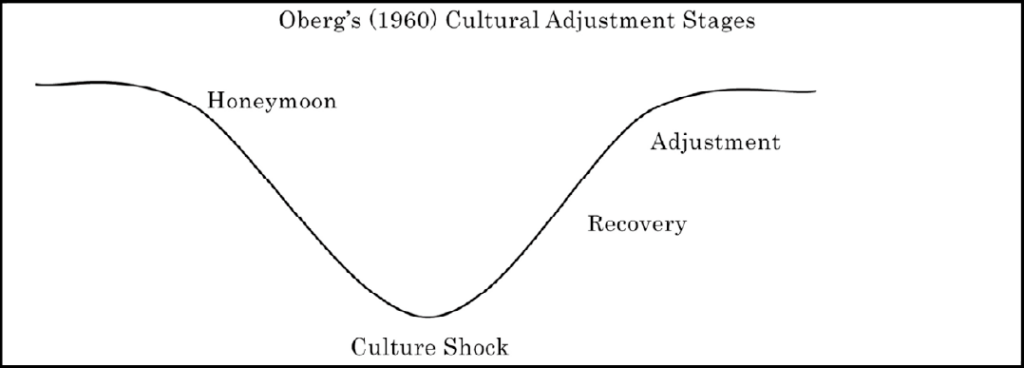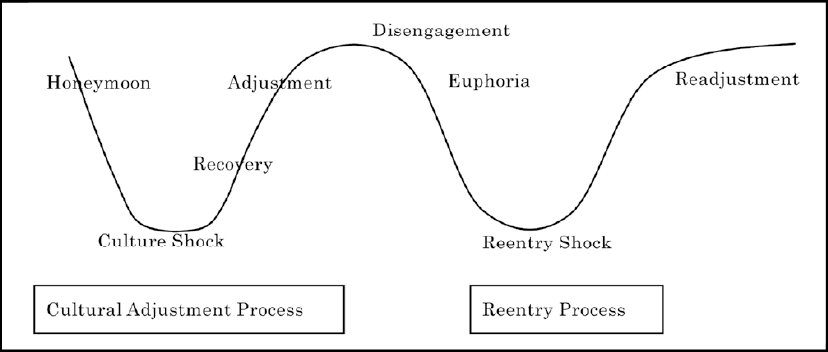Culture Shock
Update date: April 1, 2025
Culture Shock
Most people experience some form of culture shock when going abroad and experiencing different food, customs, languages, and people. Culture shock is the physical, psychological, and behavioral reaction to living or studying in unfamiliar cultural contexts. While some people have no major issues while studying abroad, other people experience significant stress.
Culture shock is not a disease, and you can minimize its negative effects by learning in advance what you are likely to experience after your arrival. In the next section, we describe the process of cultural adjustment in four stages.
Cultural Adjustment Process

Stage 1: The Honeymoon Stage
At first, you may be excited by the new environment and tend to focus on the positive aspects of your experience while downplaying some of the difficulties, occasional negative emotions, and cultural differences that may exist.
Stage 2: Culture Shock
As cultural differences become more obvious, what previously seemed exciting may become frustrating. Mental fatigue may result from constantly trying to comprehend the new culture and language. Insignificant difficulties may get blown out of proportion and become major catastrophes. Frustration and sometimes a loss of self-confidence may occur. You may feel isolated and become socially withdrawn. You might also seek security in familiar people and food.
Stage 3: Recovery
Everyday activities such as cooking using local ingredients, cleaning using local supplies, and shopping are no longer difficult. Expressing yourself has also become less of a challenge.
Stage 4: Adjustment
By this time, you may have experienced success in negotiating a variety of social situations. You may have increased language skills and can accept many Japanese customs as just a different way of being. You feel comfortable with Japanese people, and you may even feel a sense of belonging. You are now bicultural.
Note: Not everyone will experience the cultural adjustment stages in a quite the same way.
Reverse Culture Shock
If you are returning to your home country, you may experience difficulties in readapting to the realities there. While in Japan, many international students go through re-examining their cultural identity, lifestyle, values, and opinions about their home countries. Upon re-entry, you may find many things are different from how you knew them. While you might think more favorably about Japan, you may be critical of your home country. Just like the cultural adjustment process, the re-entry process can differ significantly from person to person. You may have no major readjustment issues, or you may experience severe distress in a way you would not have expected.
In this section, we will go through the process and challenges of re-entry and how to cope with the reverse culture shock you may experience upon returning to your home country. The process of reverse culture shock can be described in the following stages:
The Re-entry Process

Stage 1: Disengagement
While you are still in Japan, you may begin to start thinking about moving back to your country and leaving your overseas experiences and friends. You are emotionally preparing yourself for reentry.
Stage 2: Initial Euphoria
You may be excited to be back in your home country and your family and friends are delighted to have you back. In the beginning, people may politely listen to your stories, but you may soon find that they are ready to move on to the next topic and are not as interested in your overseas experiences as you had hoped.
Stage 3: Re-entry Shock
You may experience dampened euphoria and even feel like a stranger at home. Your home country may have changed in your eyes. The gap between expectations and reality may result in frustration, feelings of alienation, and mutual misunderstandings between you and your friends and family.
Stage 4: Gradual Readjustment
During this stage, you will begin to gradually readjust to life at home. You may become fully involved with friends, family, and activities again and feel integrated back into society. Many people at this stage realize the positive and negative aspects of both countries and have a more balanced perspective of their experiences.
Note: Not everyone will go through these stages in a linear fashion.